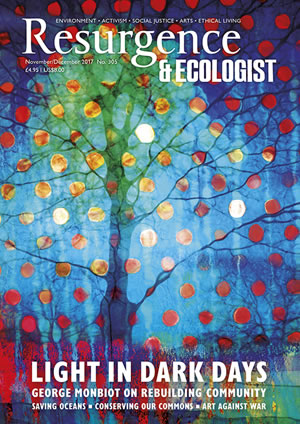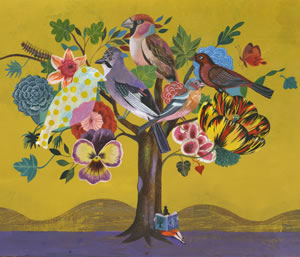There are three ways to understand and describe the relationship between Nature and humans: shallow ecology, deep ecology and reverential ecology.
It was Arne Næss, the Norwegian philosopher (1912–2009), who made the distinction between what he called “shallow ecology” and “deep ecology”, coining the latter phrase in the process. In my view this distinction is good, but not enough. Once I said to Arne, jokingly, that deep doesn’t necessarily mean good. After all, we can often find ourselves in the proverbial deep hole! So we need to go a step further than deep ecology, and that step is reverential ecology.
Shallow ecology considers Nature conservation important, but only because Nature is useful to humans. It’s an anthropocentric worldview. In this view humans are in the centre; they are a special and superior species. Humans take care of the environment – of the animals, the oceans, the rivers and the forests – so that they can benefit from Nature for a long time to come. Shallow ecologists desire a sustainable future for humanity, and Nature for them is a “resource” for the economy.
For the advocates of deep ecology, Nature has intrinsic value. Nature is not a resource for the economy. Nature is the source of life itself. Trees are good, not just because they are useful to humans, because they give us oxygen, take our carbon or give us shade, fruit, and wood: trees are good in themselves. Trees, oceans and mountains were here before humans came on the scene. How can we say that humans are superior to Nature and that Nature is made for humans? Remember, evolution. Deep ecologists recognise not just human rights, but the rights of Nature. Rivers have rights. Forests have rights.
Reverential ecology says yes to all that, but it adds an extra dimension: it considers Nature to be sacred. Life is sacred. Humans need to cultivate a sense of gratitude to Nature.
All religions have traditions of reverence for Nature. For Christians, the patron saint of ecology is St Francis. Some people consider him as the father of reverential ecology. He communed with the chickens and the wolf. My friend Martin Palmer, of the Alliance of Religions and Conservation, says that there’s a new awareness among many religious groups, who consider it their sacred duty to plant trees, take care of the land, be compassionate in farming and not put animals in factory farms with cruel conditions. Reverence for life is a religious impetus. It’s a religious responsibility to be generous and to be kind to Nature. How can we disregard, disrespect and destroy Nature if we believe that Nature is God’s creation and God’s gift?
Trees give us fruit. They give us wood. We say thank you, trees. From one little apple seed comes the tree. Then thousands upon thousands of apples are gifted to us in the following years. What generosity! Unconditional love, which is taught by the Bible and the Quran, is also taught to us by an apple tree. The tree never says, “Have you come with a Visa card?” when we want apples. The tree makes no discrimination. You are educated or uneducated? Have apples. Saint or sinner, black or white, young or old, human or animal: everyone can enjoy the feast of apples. This is an unconditional gift of love. We have to have a deep gratitude for this generosity. This is reverential ecology. We revere Gaia. We revere Nature. We revere trees.
Shallow ecologists believe that Nature is inanimate; that we humans alone have mind, intelligence and consciousness. But from a reverential ecology point of view, Nature also has a mind, spirit, soul and intelligence. The apple seed has memory; it knows exactly what to be. It never asks, “Shall I be apple or pear? Shall I be apple or oak?” No dilemma, no doubt. We humans wonder, “Shall I be a doctor or an engineer, an accountant or a priest?” but the apple tree has no doubt: it knows its true nature. It knows who it is, what it is and what it wants to be.
The moment we realise that we are all related, this planet becomes our home. The birds flying in the sky are our kith and kin. The deer and the rabbits in the forest are our brothers and sisters; even tigers and elephants, snakes and earthworms are members of one Earth family. Without the earthworm, there would be no food on our table. The earthworm works day and night, without a weekend, without a holiday, without any wages. “Long live the earthworms,” I say. Darwin developed his theory of evolution by studying earthworms, so let us be grateful to them. The moment we have that sense of gratitude, we have a sense of reverential ecology.
We are Nature. We are made of earth, air, fire, water, space, time, consciousness and imagination. Everything in the universe is in us. Without the sun or the moon, we cannot be. We are a miniature universe: microcosm of the macrocosm. With reverential ecology, we realise this expansive unity of life. With the realisation of reverential ecology, all our narrow, petty disconnections disappear. We put many labels upon ourselves. We think, I am English, I am American, I am Indian, I am Pakistani, I am a Hindu, I am a Christian, I am a Muslim, I am a Buddhist. These labels create disconnections. In reverential ecology, we are all members of one Earth community and one human family.
I was in Pakistan among the Muslims, and I’m an Indian. My friends were saying to me, “You are going to Pakistan, walking without money. Pakistan is an enemy of India. How are you going to survive?” I said to my friends, “If I go there as an Indian, I will meet a Pakistani. If I go as a Hindu, I will meet a Muslim. But if I go as a human being, I will only meet human beings. That is my primary identity. I am a human being and a member of the Earth community. With that consciousness I am released from the burden of separateness. I transform my ego into eco. With just the change of one letter, I have transformed my worldview. The moment we go from ego to eco, we touch the mind of God.”
The scientist Stephen Hawking wrote in the last paragraph of his book A Brief History of Time that one day, if we find the answer to the question of the existence of humans and the universe, we will know the mind of God. With reverential ecology in mind, we can know the mind of God in this very moment. We just need to expand our consciousness and know that we are a miniature cosmos. All the cosmic forces are in us, and we are in the cosmos. God is not somewhere beyond the sky. God is everywhere in the cosmos. God means cosmic consciousness. Reverential ecology enables us to feel at home and at ease on this beautiful planet home and in this wonderful cosmic home.
Thus we make a journey from shallow ecology to deep ecology, and from deep ecology to reverential ecology.







